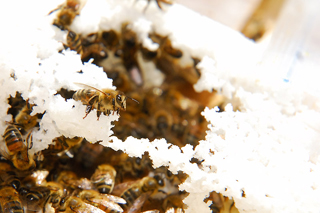
Hallelujah! Winter has arrived! Am I the only one both welcoming yet cursing the cold weather? These easterly winds are so cutting, there’s no escaping them, yet I’m hoping they are just what the bees need in order to get back into the annual cycle of things. For millions of years they have been over-wintering during December, January and February in temperatures that have kept them inside the hive in a tight cluster to maintain their warmth.

Nowadays, they fly throughout the “winter” i.e. December and January, resulting in the older bees dying off sooner than Nature intended and the colony diminishing in size prior to the arrival of Spring. With this cold weather, not even the hardiest of local bees are venturing out – any more than we do, unless we have to – which means there is hope that the clustering colonies will stay indoors, keep warm, and survive until the warmer weather in March or April, before emerging from the hive to gather fresh pollen for their young.
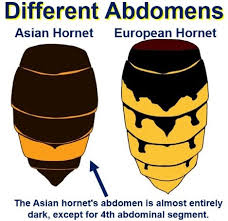
As a consequence of this, I don’t have much to report this month. I’m still busy preparing and bottling honey for sale, preparing wax products, and making sugar fondant for the bees’ winter feed. Like last month, some of the colonies are wolfing down this fondant, whilst others are totally ignoring it, as, I guess, they feel they have enough stores in their brood box to see them through.
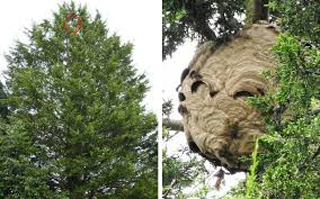 I am also preparing, though, for the arrival of the Asian Hornet. Yes, I know, I talked about this last month – and the month before – and the month before that! But there is a good reason for this. Once established in the UK, after crossing from France, the Asian Hornet will devastate our UK beekeeping – and it will come!! The hornets devour our bees by “hawking” at the entrances to our hives, killing off returning foragers by biting off their heads! They then ditch the abdomen and take away the thorax to feed their young. Asian Hornet colony reproduction rate is phenomenal, as they produce dozens of queens at the end of the season. These queens hibernate over winter, then emerge in the Spring to found new nests and the cycle starts over again – many times over!
I am also preparing, though, for the arrival of the Asian Hornet. Yes, I know, I talked about this last month – and the month before – and the month before that! But there is a good reason for this. Once established in the UK, after crossing from France, the Asian Hornet will devastate our UK beekeeping – and it will come!! The hornets devour our bees by “hawking” at the entrances to our hives, killing off returning foragers by biting off their heads! They then ditch the abdomen and take away the thorax to feed their young. Asian Hornet colony reproduction rate is phenomenal, as they produce dozens of queens at the end of the season. These queens hibernate over winter, then emerge in the Spring to found new nests and the cycle starts over again – many times over!
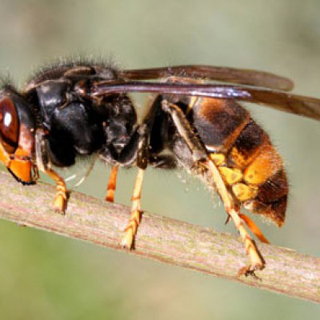 British beekeepers are not just sitting back and waiting.. FERA (DEFRA as was) and the NBU (National Bee Unit) have contingency procedures in place to deal with any sightings – but in 2016 there were 2700 reported sightings (one in Tetbury, the others false alarms). In 2017 there were 4500 reported sightings (one in Woolacombe with another Hornet being found dead in a Scotland warehouse in February where it had come in on a pallet from overseas.
British beekeepers are not just sitting back and waiting.. FERA (DEFRA as was) and the NBU (National Bee Unit) have contingency procedures in place to deal with any sightings – but in 2016 there were 2700 reported sightings (one in Tetbury, the others false alarms). In 2017 there were 4500 reported sightings (one in Woolacombe with another Hornet being found dead in a Scotland warehouse in February where it had come in on a pallet from overseas.
As it was dead it obviously hadn’t established a nest due to the time of year therefore no further action was needed). As a consequence, the NBU has been sceptical about telephone and email reports of sightings (some reported sightings were European or Japanese hornets which do not pose such an immense threat), though in France in 2017 over 900 Hornet nests were found and destroyed.
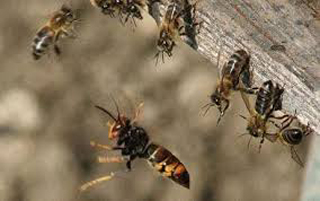 Rather than wait for the NBU to become convinced of the veracity of a reported sighting, Devon Beekeepers’ Association – and we in the Roseland Group of Cornwall Beekeepers’ Association – are setting up Asian Hornet Action Teams (AHATs) comprising local beekeepers who are willing to do the initial investigation prior to the NBU becoming involved. This means we can identify very quickly at a local level whether or not the sighting is of an actual Asian Hornet and if so get the NBU involved by showing credible evidence. I will keep you updated with progress as our AHAT develops its strategy.
Rather than wait for the NBU to become convinced of the veracity of a reported sighting, Devon Beekeepers’ Association – and we in the Roseland Group of Cornwall Beekeepers’ Association – are setting up Asian Hornet Action Teams (AHATs) comprising local beekeepers who are willing to do the initial investigation prior to the NBU becoming involved. This means we can identify very quickly at a local level whether or not the sighting is of an actual Asian Hornet and if so get the NBU involved by showing credible evidence. I will keep you updated with progress as our AHAT develops its strategy.
Nothing more to say, really. Just looking forward to the end of March when, I hope, the new beekeeping season will be starting in earnest.
Colin Rees – 01872 501313 – colinbeeman@aol.com

